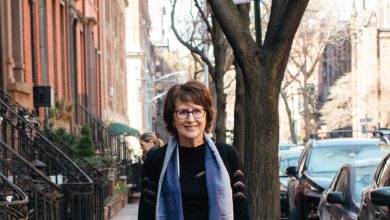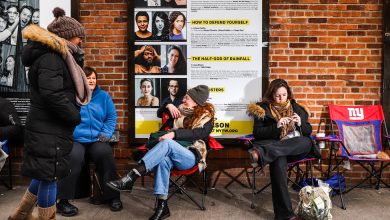A Fight at Columbia’s School of Social Work

More from our inbox:
- Rooming Houses as a Solution to Homelessness
- My Family’s Story

Credit…Illustration by Sam Whitney/The New York Times
To the Editor:
Re “What Is Happening at the Columbia School of Social Work?,” by Pamela Paul (column, Dec. 18):
I am outraged by Ms. Paul’s column. I don’t know what is happening at the Columbia School of Social Work, but if engagement around issues of social justice and racism were entering the curriculum only in recent years, it would be a very unusual social work school.
The equally renowned Smith College School for Social Work, from which I received an M.S.W. 32 years ago, identified itself as an “anti-racist institution” shortly after my cohort graduated, and a critical understanding of race and racism is central to everything that is taught (and hopefully learned) there. It’s hard to imagine that Columbia is lagging far behind.
My experience has been that — contrary to the stereotypes that abound in Ms. Paul’s essay — social workers at our best are compassionate, brave and radical, alert to the oppressive conditions that harm our clients and our communities and active in working to change those conditions.
The National Association of Social Workers’ Code of Ethics identifies social justice as a core value of our profession and one of our fundamental ethical principles: “Social workers challenge social injustice. Social workers pursue social change, particularly with and on behalf of vulnerable and oppressed individuals and groups of people. These activities seek to promote sensitivity to and knowledge about oppression and cultural and ethnic diversity.”
While Ms. Paul may be correct that many Columbia M.S.W. graduates eventually enter private practice, that is probably not the most effective way to repay school loans. That goal may be better served by working in the public or nonprofit sectors, where the employing agency may help repay the loans or the loans may eventually be forgiven.
Victoria Rhodin
Montpelier, Vt.
To the Editor:
I graduated from Columbia’s School of Social Work in 2010. Columbia had not yet devolved into the bastion of thoughtless ideology that it is today, but it was already on its way when I left there.
Since then, many in the field of psychotherapy and psychoanalysis, including some training institutes, have gone in the same direction, fracturing the focus on our common humanity into a million tiny, reactionary pieces.
Constance Morrill
New York
To the Editor:
I graduated from the Columbia School of Social Work in 1966 and am still working today.
I was shocked and enormously saddened after reading Pamela Paul’s description of what had formerly been my special place. I have always credited the Columbia School of Social Work with its emphasis on tolerance, empathy and inclusiveness as responsible for my long, rewarding career in which I have been able to understand and enhance the lives of people of all ages, races and backgrounds.
I am painfully aware that the current divisive atmosphere in the school will neither help students create meaningful, satisfying work nor improve the challenging world that we live in today.
Barbara Bessin Zucker
New York
To the Editor:
Pamela Paul expresses concerns about an ideological shift in social work education, suggesting that an increased focus on social justice might negatively affect mental health care provided by social workers.
As a social worker and an educator, I find it crucial to address these assertions. Not all social work graduates pursue mental health practice; many contribute to nonprofits, mutual aid groups and government agencies, all benefiting from a foundation in social justice and community awareness.
Ms. Paul oversimplifies the connection between school curriculum and direct clinical practice, overlooking state regulations and the extensive clinical training and supervision required for full licensure for social workers on that path.
Christopher Ferraris
New York
The writer is an adjunct lecturer at the Columbia School of Social Work. His views are his own.
Rooming Houses as a Solution to Homelessness
To the Editor:
Re “The Old New Way to Provide Cheap Housing,” by Nicholas Kristof (column, Dec. 10):
I was pleased to read Mr. Kristof’s column about the positive effect that single-room occupancy (S.R.O.) housing can have on communities struggling with increased homelessness. I agree that “there’s no one answer to America’s housing crisis” and that local governments have a role to play. Anyone who works in this space will tell you that the biggest impediment to getting housing for everyone is zoning.
Given today’s housing and affordability crisis and the significant advances in privacy and security technology, a new, upgraded version of S.R.O.s called multi-tenant housing units (MTHU) offers all of the benefits for meeting today’s housing challenges facing low-income residents without any of the security or privacy concerns of the past.
MTHUs have been adopted in Toronto. There are also forms of rooming houses in San Jose, Calif.; Houston; and the state of Massachusetts.
With proper regulations, MTHUs are one piece to solving the affordable-housing puzzle. Providing clean, safe and affordable housing for individuals earning as little as $18,000 annually is a good thing, and cities would be wise to take a look at this model.
Kurt Jetta
Delray Beach, Fla.
The writer is president of the Florida Housing Innovations Council.
To the Editor:
Nicholas Kristof hits on one of the perfectly viable solutions to homelessness. The boardinghouse or Airbnb model could go a long way toward putting roofs over people’s heads. One needs only a room and a shared kitchen and bathroom to feel safe, warm and sheltered.
I know. I moved to Switzerland in 2020 and used Airbnbs and other types of room rentals for two years before finding my own apartment. These accommodations were not only perfectly suitable and affordable but also fun. I made friends of hosts and other residents and, really, sharing a stove and a bathroom is no hardship.
One of my hosts was a pastry guru, and coming into the kitchen to a fresh fruit pie with a “Help yourself, Sue” note on the counter was a perk I’ll never forget. A boardinghouse needn’t be forever; further affordable-housing models are needed for long-term solutions. But as a transition, it’s a fantastic option.
Susan Wunder
Therwil, Switzerland
My Family’s Story
To the Editor:
I am a first-generation American. My mother fled Nazi Germany in 1936 with her mother, father and brother. My father fled in 1939, alone and very late in the terrors the Nazis were inflicting on German Jews.
My father had passed the German law bar and was taking postgraduate courses to enter the German diplomatic corps. When he fled to the U.S. his German law degree was useless. So he started sweeping floors in a factory and worked his way up to sorting bolts of cloth in the factory.
Eventually he was able to go back to college at night in the U.S., after marrying and having me as a toddler at home. He got his bachelor’s degree in economics.
When I asked him why he didn’t pursue a law degree here as he had in Germany, he said, “If I ever had to flee this country I didn’t want to have another useless law degree.”
I said, “Dad, you’d never have to flee the U.S.!”
And he replied, “That’s what I thought in Germany.”
Jeff Lynn
Burlington, N.C.





